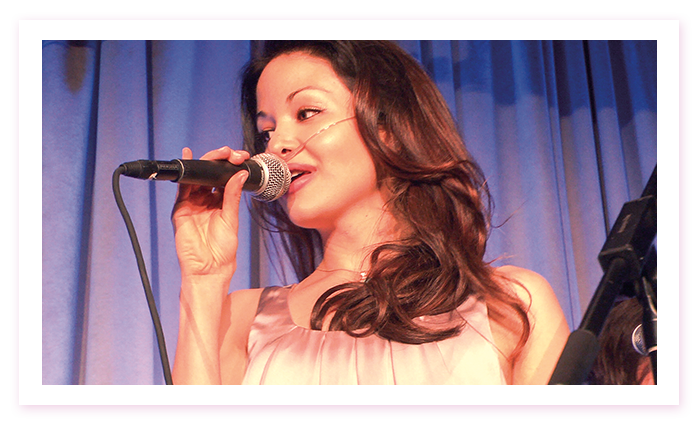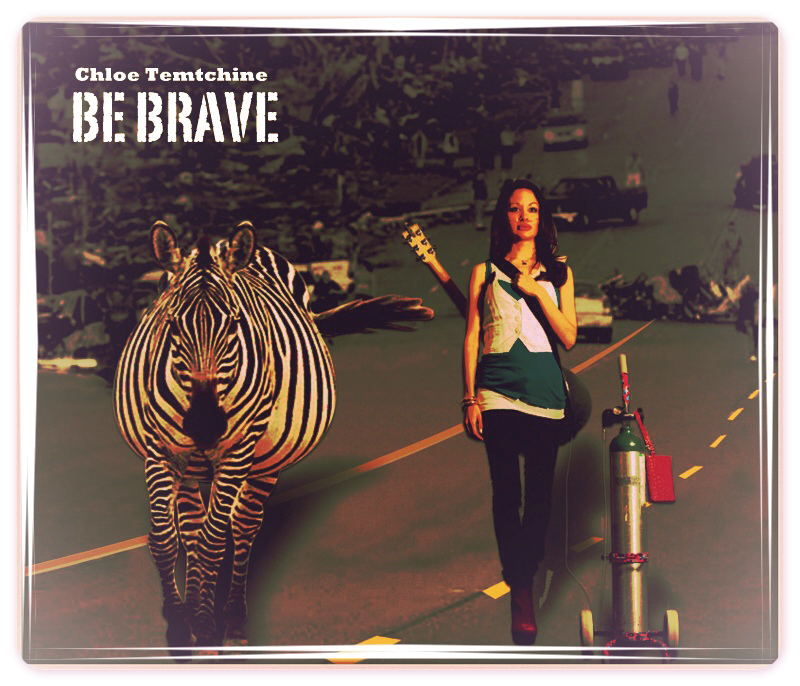High Notes
New York-based singer, songwriter and musician Chloe Temtchine has won rave reviews and awards for her solo work and collaborations with other top music industry artists. On March 29, 2014, Temtchine’s new song, “Be Brave,” will be released on iTunes, with fifty percent of the proceeds benefiting PHA. Diagnosed with pulmonary hypertension in 2013, Temtchine performs with her oxygen tank, which she has dubbed “Steve Martin,” alongside her. Community spoke with Temtchine about life, music and pulmonary hypertension.

When did you start singing and songwriting? Who and which styles are some of your biggest influences?
I started singing at about the age of six. My father used to take me to a Baptist church in Harlem, on Sundays, where I listened to gospel music for hours. That’s where it all began.
I’ve always had very eclectic taste in music: from artists like Edy Phenomene (French dancehall), to Smokie Norful and Kim Burrell (gospel), to Stevie Wonder and Sam Cooke (R&B/soul), to James Vincent McMorrow and Ray Lamontagne (singers/songwriters), to Eric Reed (jazz). The list could go on forever.
When and how were you first diagnosed with pulmonary hypertension? What were your initial symptoms?
In March 2013, after my cardiologist reviewed an echo and listened to my heart, I was diagnosed with severe pulmonary hypertension and was rushed to the ER. The shortness of breath, lung pain, and fatigue that had started five years previously had become progressively worse, and I had reached a point where I could barely move. Getting to the bathroom was a major accomplishment! Then my heart started beating out of my chest. And then, together with the continued chest pain that accompanied every breath, I suddenly put on 10 pounds of water weight overnight.

What is “Be Brave” about?
After being diagnosed, I found myself spending so much time trying not to die that I had forgotten to live. “Be Brave” is about making the choice to live.
Every time I went to the hospital, I came home feeling that there was very little hope. I realized that if I didn’t shift my consciousness quickly, my condition would continue to get worse.
I’m a big believer that our minds play a huge role in the state of our health. Keeping my mind in the right place is so important to me that I decided to write a song about it. I wanted to remind myself, and anyone else going through a similar experience, that any challenge had the potential to be an opportunity.
What inspires you in songwriting?
I’m much more comfortable expressing myself through song. Music captures the way I feel in a way that words without melody can’t seem to do.
What have you learned in dealing with pulmonary hypertension? What have been some of your biggest challenges, and how have you dealt with them?
Although I would do just about anything not to have pulmonary hypertension, I’ve understood through this process that there are many lessons I’m meant to be learning. I am very grateful for the perspective it has given me with regard to my life.
My biggest challenge was seeing a future when I was told that it was highly unlikely that I would have one. This continues to be my biggest challenge.
What do you think is most important for the newly diagnosed to know about pulmonary hypertension?
For the newly diagnosed, I would say: Surround yourself with positive people who instill hope in you, eat a very healthy diet (plant-based, if possible), go to pulmonary therapy, focus on other people’s success stories, and most importantly, believe that it is possible to get better no matter what you’ve been told.
How does being a singer, musician and songwriter help you deal with pulmonary hypertension?

I think that being inspired and passionate in general is helpful to anyone. I also think that it’s very important to express yourself in order to keep yourself in balance. Through music, I’m able to get out all of the things that I would otherwise potentially keep in.
What is next for you in terms of treatment for PH?
I’m not totally sure at the moment. Because there is a belief that I may have pulmonary veno-occlusive disease in addition to PH, my doctor is going very slowly with the medications, which I’m very grateful for. Lung transplantation has been suggested, and although I’m thankful that it exists as an option, my goal is to stay away from it, if at all possible.
What’s next for you in music?
My next goal in music is to finish writing the album I began when I got out of the critical care unit and to perform as much as possible.
What do you enjoy most about music?
I love that music has always had the ability to completely alter the way I feel. It has helped me be hopeful during very difficult times. I love the idea of creating something that could not only alter my own state, but that also has the potential to alter the state of someone else who may be in need of some state-altering!
—EL
Contact us
Did you enjoy this story? Email us your comments and questions and let's keep the conversation going. We encourage you to engage with us and other readers by following us on Facebook, Twitter, Instagram and Pinterest. Every person's journey is unique, and every perspective is valuable to us.

